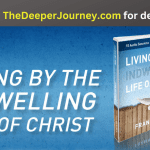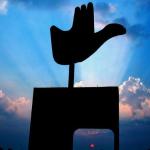By Jeremy Berg, one of my DMin students at Northern Seminary.
“They were talking with each other about everything that had happened … They stood still, their faces downcast” (Luke 24:14, 17).
A murderous rampage fills the headlines again. Senseless evil has again snuffed out so many innocent lives. How long, O Lord, will evil persist? The dark cloud of death hovers over our land again. A lump hangs in our collective throat.
I wept my way through a dull, rainy Monday as I joined a nation in grieving and “talking with each other about everything that had happened” (Luke 24:14) in Las Vegas Sunday evening. As a nation in disbelief, “we stood still, our faces downcast” (Luke 24:17).
My eyes alternated their gaze from my computer screen (getting updates on the Las Vegas Massacre) down to the ground; back to the screen to answer some emails, do some writing, and back to the ground — my eyes downcast — shuffling from place to place and task to task under the shadow of death.
As a pastor I feel a sacred responsibility to bring a word of hope into such hopelessness. I feel an obligation to find some shred of light to shine into such oppressive darkness. For four days straight I went on to Facebook, with fingers poised to break the silence with a comforting word. I came up empty each time.
There are times to sit silently, times to just let the tears flow and merely let those inaudible groans emerge from that deep place in all of us that longs for the day when there will be no more death and evil and suffering. “How long, O Lord? Lord, have mercy. Christ have mercy,” is all that came.
Where do we turn our faces when death seems to have won the day? Where can we fix our eyes when all hope seems to be lost?
Then I began preparing for our new Wednesday evening Eucharist service, and wondered where the breaking of bread might intersect with such gut-wrenching despair. I got it!
A story at the end of the Gospel of Luke introduces us to two people who are asking similar questions as they walk along a dusty road with despair in their hearts and their deepest hopes dashed. A murderous mob. A senseless death. An innocent life snuffed out in his prime filled the Jerusalem headlines.
They tried to console one another. They must somehow pick up the pieces of their shattered lives and find a way forward with their greatest hope dashed. Out of nowhere a stranger joins up with them as they walk and talk about the tragic events. The stranger, like someone who turned their phone off for a weekend up north, is seemingly unaware of the entire tragedy (boy are they mistaken!). He asks, “What are you talking about as you walk along” (24:17)?
One of them, named Cleopas, answers: “Are you the only one visiting Jerusalem who does not know the things that have happened there in these days?”
19 “What things?” he asked.
“About Jesus of Nazareth,” they replied. “He was a prophet, powerful in word and deed before God and all the people. 20 The chief priests and our rulershanded him over to be sentenced to death, and they crucified him; 21 but we had hoped that he was the one who was going to redeem Israel.
I imagine the conversation with this mysterious stranger continued for a while as an emotional dam burst and tears flowed forth:
“We had hoped. We had hoped he was the one. We had hoped he was the one to restore our fortunes. We had left everything to follow him. We had built an entirely new life around him. We believed in him. We were counting on him. We just planned out our next 10 years around him. Now he’s dead. Senselessly murdered. He was innocent. Why would God allow this? What future is there now? What hope is left? Death wins again. There is no justice. Is there any hope left for this world?”
Have you ever opened up to a stranger, maybe a doctor or person you’ve only recently met, and found yourself strangely vulnerable in their presence? Who was this stranger who came, apparently out of nowhere, to walk alongside these grieving folks on their seven mile journey from utter heartache in Jerusalem to the gloomy and uncertain future that awaits them back in Emmaus?
I needed this friendly stranger, this familiar yet foreign visitor’s presence this Monday as I trudged along with eyes downcast, overwhelmed by darkness and feeling Death’s sharp sting. We all did. And he does still come alongside those who will welcome his company.
The story continues:
28 As they approached the village to which they were going, [the stranger] continued on as if he were going farther. 29 But they urged him strongly, “Stay with us, for it is nearly evening; the day is almost over.” So he went in to stay with them.
Stay with us! Please don’t leave so soon! The darkness of night is approaching an already too dark day. Stay with us. Even though they still don’t know who this stranger is…there’s something about his presence that shines like a night light in a child’s bedroom, scaring away the monsters and that fears lurk.
They gather around an old wooden table in a run down country inn. A lit candle sits at the center. Light and shadows flicker about the room. The stranger pours a cup and pulls a hunk of bread from his sack.
30 When he was at the table with them, he took bread, gave thanks, broke it and began to give it to them. 31 Then their eyes were opened and they recognized him, and he disappeared from their sight. 32 They asked each other, “Were not our hearts burning within us while he talked with us on the road and opened the Scriptures to us?” (Luke 24:30-32)
Sitting around that table the hidden face of God suddenly becomes visible. In the breaking of bread, the stranger we discover is a long, lost friend. At the table, the empty hole in our heart is suddenly filled. In the breaking bread, the darkness is vanquished by piercing light. Around that table, Hope is resurrected to dance a jig on the corpse of Despair. Around that table the lump in our throat is replaced by an irresistible burning in our heart.
Jesus meets us still through the mystery of the Eucharist — the breaking of bread and sharing the sacred cup. And there’s no better place to break that loaf and share the eucharistic table than in the middle of our deepest pain, in the crucible of our greatest sufferings, while standing over the casket of a loved one or in the fog of disbelief at another heinous act of evil. These are the moments when we need our downcast eyes to be opened and turned toward the reality of Christ Among Us.
The Eucharist proclaims the Lord’s death until he comes again to vanquish death forever (1 Cor. 11). But, as the couple on the road to Emmaus discovered long ago, the One who presides over this meal (until He comes) is also the Presence of the Resurrected One who has already won the ultimate victory. We come to the Lord’s Table to say “Thank You” (eucharisto) for letting us share in the hope of the resurrection. Thank you for shining a ray of light into this horrible, horrendous moment. Thank you that Death does not have the last word.
How many people in our broken world are beginning to lose hope? How many are tempted to let the dark cloud settle forever over our deepest longings? How many people around us today are standing paralyzed, faces downcast and no one to lift their eyes up?
They are awaiting a comforting stranger to come alongside them in their darkest hour, to invite them to the Lord’s Table. Perhaps in the breaking of bread they, too, will recognize the World’s True Light and Resurrected Savior! At the Table they too might come to realize that God is not far away and disinterested in our pain. He has entered into our sufferings, and taken the worst onto himself on the cross. At the Table we remember that just as we share in his death (by baptism and eucharist), we shall also share in his resurrection!
Now I wonder: Are you that stranger through whom Christ wants come alongside a soul in need today?
33 They got up and returned at once to Jerusalem. There they found the Eleven and those with them, assembled together 34 and saying, “It is true! The Lord has risen and has appeared to Simon.” 35 Then the two told what had happened on the way, and how Jesus was recognized by them when he broke the bread.
May our downcast faces and tear-filled eyes be lifted up by the loving stranger who comes alongside us in the Eucharist, and may our grieving hearts be filled with resurrection hope even when we find ourselves walking through the valley of the shadow of death.















